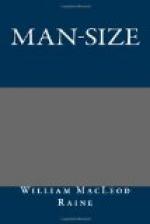The American turned away hurriedly, not to show the tears that unexpectedly brimmed his lids. Though he wore the hard surface of the frontier, his was a sensitive soul. He was very fond of this gay, gallant youth who went out to meet adventure as though it were a lover with whom he had an appointment. They had gone through hell together, and the fires of the furnace had proved the Canadian true gold. After all, Tom was himself scarcely more than a boy in years. He cherished, deep hidden in him, the dreams and illusions that long contact with the world is likely to dispel. At New Haven and Cambridge lads of his age were larking beneath the elms and playing childish pranks on each other.
West drove the team. Tom either broke trail or followed. He came across plenty of tracks, but most of them were old ones. He recognized the spoor of deer, bear, and innumerable rabbits. Toward noon fresh caribou tracks crossed their path. The slot pointed south. Over a soft and rotting trail Morse swung round in pursuit.
They made heavy going of it. He had to break trail through slushy snow. His shoes broke through the crust and clogged with the sludgy stuff so that his feet were greatly weighted. Fatigue pressed like a load on his shoulders. The dogs and West wallowed behind.
By night probably the trail would be much better, but they dared not wait till then. The caribou would not stop to suit the convenience of the hunters. This might be the last shot in the locker. Every dragging lift of the webs carried Morse farther from camp, but food had to be found and in quantity.
It was close to dusk when Tom guessed they were getting near the herd. He tied the train to a tree and pushed on with West. Just before nightfall he sighted the herd grazing on muskeg moss. There were about a dozen in all. The wind was fortunately right.
Tom motioned to West not to follow him. On hands and knees the hunter crept forward, taking advantage of such cover as he could find. It was a slow, cold business, but he was not here for pleasure. A mistake might mean the difference between life and death for him and Win Beresford.
For a stalker to determine the precise moment when to shoot is usually a nice decision. Perhaps he can gain another dozen yards on his prey. On the other hand, by moving closer he may startle them and lose his chance. With so much at stake Tom felt for the second time in his life the palsy that goes with buck fever.
A buck flung up his head and sniffed toward the hidden danger. Tom knew the sign of startled doubt. Instantly his trembling ceased. He aimed carefully and fired. The deer dropped in its tracks. Again he fired—twice—three times. The last shot was a wild one, sent on a hundredth chance. The herd vanished in the gathering darkness.
Tom swung forward exultant, his webs swishing swiftly over the snow. He had dropped two. A second buck had fallen, risen, run fifty yards, and come to earth again. The hunter’s rifle was ready in case either of the caribou sprang up. He found the first one dead, the other badly wounded. At once he put the buck out of its pain.




